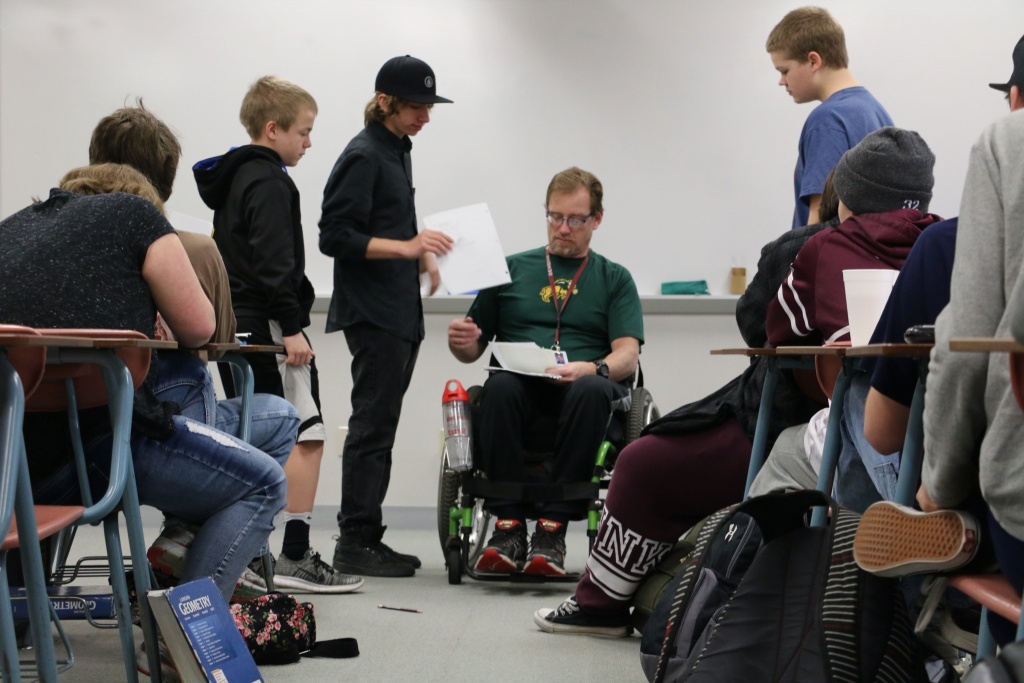 Mark Unteseher: Life in a New Lane
Mark Unteseher: Life in a New Lane
By Ann McKenzie
Mark Unteseher had just finished building a giant 38 x 44 foot shop with 16 foot sidewalls for his father-in-law. He had been up and down a ladder all day long putting up rafters, so climbing it one more time to cut down a dead branch from one of his cottonwood trees for the upcoming Fourth of July bonfire was just one more chore to check off his list.
Besides putting one foot on the ladder, and one foot on the tree, Mark does not remember much else about that day. The branch hit the ladder on the way down, bent it at a 90 degree angle, and sent Mark plunging to the ground.
“I even thought about tying off,” Mark says. “I was in such a hurry to get the job done so that I could have firewood. But, it totally changed everything.”
Mark’s fall left him with fractured C3 and C4 vertebrates, broken T5 and T6 vertebrates, lacerations on his leg, three broken ribs, a punctured lung, and a broken sternum. For a workaholic like Mark who put all of his energy into building, coaching, teaching, and hunting, this accident was the ultimate roadblock.
“I told the doctor, ‘If I can’t walk, I don’t want to live,’” Mark recalls. “I’ve lived a good life, I’ve travelled all over the place, and I’m happy. I’m not afraid of death, and I’m not afraid of dying. I told the doctor, ‘If I’m not going to walk, you tell that anesthesiologist to put something into that gas—I don’t want to wake up again.’ The doctor said, ‘You know Mark, I can’t do that.’”
One of the things that changed Mark’s mind about wanting to live were some summer school students from Century High School. He was lying in his hospital bed when about 14 or 15 girls came to visit him. They brought bags of his favorite peanut M&Ms and a homemade card that everyone signed. But what really tugged at his heart was when they started singing his favorite song at the time, “Girl Crush” by Little Big Town. It was a song Mark had played daily in class.
“It was so beautiful,” Mark says. “They were in perfect harmony. Them singing that song, it hit me right here. It was tough. I just had tears rolling down my face and it’s like unbelievable that they did this for me. It was like goodness sakes, you’ve done it now. I need to be around here.”
Mark spent three months at Craig Hospital in Denver, Colorado. The average stay for people in his condition is six to eight months. Craig Hospital is a nonprofit hospital that specializes in caring for people with spinal cord and traumatic brain injuries. One of the toughest things Mark has had to learn is adapting to being in the wheelchair.
“When I had to order my wheelchair, it was like—this is permanent, this is it,” Mark says. “I think the permanency is what is tough because I was so active. I like to run. I mean, that’s one thing I can’t do anymore. I can’t run. I can still do sports and stuff like that, but not being able to run is hard.”
Running has always been a part of Mark’s life. While coaching, he always ran with the kids during practices.
“Running is something you can do your whole entire life,” Mark says.
Mark still plays basketball—he plays wheelchair basketball. He is also back to coaching track and cross-country.
“I have an attachment that goes in front of my chair,” Mark explains. “It makes my wheelchair go up to 15 mph, so that’s pretty good. Someday I’ll probably invest in a bicycle. That was something I enjoyed doing at Craig Hospital. They are pretty steep in price though—around $6,000.”
Another hobby Mark looks forward to is hunting each year. He deer hunts and bird hunts with friends he’s known a long time.
“I go hunting with Randy Palmer,” Mark says. “I have a UTV, so somebody can drive. I hunt with Joel Puffe too. He likes riding in the UTV. Mike McDonald also likes to go. I do look forward to hunting with them. It’s something I really enjoy.”
Time has played a major role in most everything Mark does. Getting ready in the morning used to take him 10 minutes; it now takes him an hour. He can still do many of the things he did before, but it just takes more time to do them. He dresses himself, bathes himself, does dishes, and cooks his own food.
“I used to cook for the whole family, but my wife would rather that I not do that anymore,” Mark says. “So, she comes home and cooks. I still do chores around the house like I vacuum, but I don’t do as much as I used to do.”
Another change Mark made was prioritizing his time. Since the accident, he doesn’t go home and work all the time. He used to make extra money on the side by building for other people.
“It was a bad thing I got injured, but the one thing it did was slow me down,” Mark says. “I used to work all the time—all the time. Now, I spend more time with my family, my kids, and the kids here (Bismarck High). I’m going to all their athletic events, which I never did before.”
Mark feels fortunate to be back in the classroom teaching math, and outside coaching track and cross-country.
“Things are getting easier for me,” Mark says. “I go through depression just like everybody else. When things get easier and I have less pain, I think, ‘Hey, I can live with this.’”
 Annie McKenzie teaches English, journalism, and leadership classes at Bismarck High School. She is a loving wife and mother to two beautiful boys. Born an extravert, she loves people of all ages, and never tires of conversation. If sipping coffee with friends all day were a profession, she’d be a millionaire.
Annie McKenzie teaches English, journalism, and leadership classes at Bismarck High School. She is a loving wife and mother to two beautiful boys. Born an extravert, she loves people of all ages, and never tires of conversation. If sipping coffee with friends all day were a profession, she’d be a millionaire.
